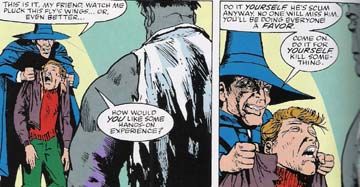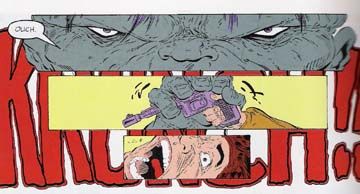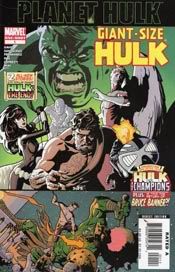 Giant-Size Hulk #1
Giant-Size Hulk #1By Peter David, Greg Pak, Juan Santacruz, Aaron Lopresti, and Dale Keown
Published by Marvel; $4.99 US
The last time we got a single Hulk issue this size was back in 2001 with the "Monster-sized" Incredible Hulk #33, which featured an original fill-in by Christopher Priest and some reprints from both the heyday of Len Wein and the dawn of Peter David’s first Hulk run. The reprints were cool and Priest’s story was funny and touching, but the stories didn’t really have anything to do with where the character was going or any strong connection with each other. In comparison, Giant-Size Hulk #1 gives us “Green Pieces,” a Hulk vs. Champions story that, if the solicitations are trustworthy, holds some connection to a post-Planet-Hulk event; "Banner War," a "Planet Hulk" interlude that answers the question of why the Hulk’s paler half has been absent from Sakaar; brief interviews with Greg Pak and Anthony Flamini (writer of the upcoming Planet Hulk Gladiator Guidebook); and a beautiful reprint of Incredible Hulk: The End, the first of Marvel’s "The End" books that premiered in 2002 and reunited Peter David and Dale Keown on a Hulk book for the first time since 1996’s Hulk/Pitt, and whose climax has an interesting connection with Pak’s "Banner War."
The clash between the Hulk and the Champions (perhaps the most awkwardly cast super-hero team in history, and this is coming from a hardcore Defenders fan) comes first and is set hard on the heels of the battle royal featured in 1977’s Champions #16. With the exception of David’s trademark quips, it channels the classic Hulk-fights-someone-who-thinks-he’s-a-bastard-and-feels-bad-about-it-later stories of the 70’s, and that’s a good thing. For an 18-pager, we get a respectable tussle between greenskin and the Champions, as well as a surprise guest appearance.
Maybe it’s because I’ve read so much of David’s stuff that the humor has grown stale, but a lot of the funny just doesn’t work for me. The set-ups to jokes seem a little self-conscious, but I did get a nice chuckle out of Hercules’s commentary on the screwy time-logic of the Marvel Universe.
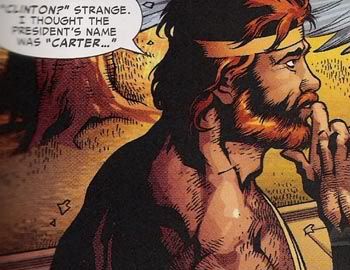
The solicit for Giant-Size Hulk promised that "Green Pieces" would hold "a key to Post-PLANET HULK events!" What’s the key? No clue. Probably the clearest possibility has something to do with Hercules’s regret at the end of the story. Since Herc’s in the anti-registration camp of Civil War, at least a good chunk of the Illuminati members are on the opposite side, and if/when Hulk returns to Earth looking for payback he may be gunning for the Illuminati, maybe the "key" has something to do with a post-Civil-War alliance? Another possibility has to do with the aforementioned surprise guest, but there’s less of an obvious connection there.
Initially I had one minor quibble about Hercules’s lamentation. I wondered if this chipped out a bit of continuity in regards to later meetings between Hercules and Hulk, particularly in reference to Byrne’s and Milgrom’s Hulk/Bi-Coastal Avengers battles when Hercules seemed so excited at the chance of another knuckle-bruising with the Hulkster, as well as David’s Incredible Hulk - Hercules Unleashed in which the demigod was suspicious of the green goliath’s connection with the Avengers’ "deaths" and was hellbent on either recruiting or pounding on him. I thought about it though, and in the end I don’t think there’s any discrepancy there. I think it’s absolutely believable to assume that Herc’s passion for fisticuffs overpowered his memory, just as it tends to overpower what little common sense and decorum he possesses.
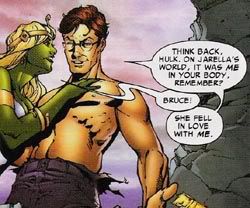
Over the years Hulk has given us a lot of dreamy sequences in which Banner and Hulk meet to hash things out either literally in dreams or on some kind of hypnosis-induced mental plane. Pak’s "Banner War" is a surprisingly original chapter in this ongoing conflict for one simple reason: Banner ain’t the victim this time around.
In most stories like this, we either see Banner imagining himself in physical conflict with – or simply being chased down by – the Hulk, or – as was the case in David’s first run and Jenkins’s as well – the various personalities rolling around Banner’s head are on a more level playing field. "Banner War" turns the paradigm on its head, portraying Banner as an emotional tyrant trying to belittle the Hulk into submission. Banner is at his most irrational, saying things like, "Let me take over. I’ll find the ship. I’ll fix it. We’ll go to the planet Reed wanted us to go to." Apparently, Banner forgets that there’s an army between him and the spaceship; an army even the Hulk might have a hard time plowing through. It's Banner, and not Hulk, who viciously rips at his alter-ego's insecurities in order to prove he's the dominant persona.

One of the most enjoyable parts of the story is Hulk imagining his vengeance on Earth’s heroes. There’s some great dialogue, including some digs at recent Hulk appearances in books like Ultimate Wolverine vs. Hulk, Sentry, and even, during a dreamed return to Jarella’s World, Pak’s own story ("Look at you living these old stories again…This is embarrassing.").
"Banner War" should prove, for anyone who’s been wondering, that Pak has the chops not only to bring the action back to Incredible Hulk, but give us some new spins on the Banner/Hulk relationship. I’m more convinced than ever that I’d like to see Pak continue after "Planet Hulk" closes its doors.
Considering Hulk, and not Banner, is on the cover of future "Planet Hulk" additions, it shouldn’t be too tough to figure out who wins the conflict. Whether it was coincidence or not, the end of "Banner War" echoes the events of the third piece in Giant-Size Hulk: a reprint of Peter David and Dale Keown’s Incredible Hulk: The End.
"The Last Titan" was originally published as a short story in the 1998 prose collection, The Ultimate Hulk. David and Keown adapted it for comics for the first of Marvel’s "The End" books, and the issue has since become notoriously difficult to find in back-issue bins or auction sites. Incredible Hulk: The End shows us a world in which Bruce Banner is literally the last human on Earth. Humanity and its heroes have been wiped out by a nuclear holocaust, leaving Banner to wander aimlessly across the Americas, with only a ravenous horde of evolved cockroaches and an alien vidbot to keep him company. Keown’s art is beautiful, and comparing it to his early work on Hulk reveals a wonderful evolution in his craft (that, unfortunately, helped to make his last work on the character, Darkness/Hulk, so disappointing).
The war between Banner and Hulk has never been more vicious, and the end result is sad, chilling, and David portrays it so perfectly that you end up asking yourself how it could ever have ended any other way. The story of how the nuclear holocaust takes place - terrorist attacks followed by US retaliation - is particularly eerie when you remember Incredible Hulk: The End was originally released not too long after 9/11. In fact the double-page spread that chronicles the event features a picture of Hulk standing atop a pile of rubble that was altered for Marvel's post-9/11 Heroes collection to show Hulk holding an American flag.
My only problem with the story is Banner’s revelation regarding the connection between himself and the mythic figure Prometheus. The Hulk-Prometheus link is indicative of David’s tireless dedication and ingenuity towards constantly re-defining a character he’d handled for over a decade, but the way it’s presented feels a bit like spoon-feeding and even a little too academic. David has never been sneaky or subtle about his metaphors, and this one is brilliant. I guess that’s the problem. It’s not just brilliant in the sense that it’s smart, but brilliant in the sense that it’s glaring. Still, despite its faults, "The Last Titan" is touching and one of the better Hulk tales of the last half-dozen years or so.
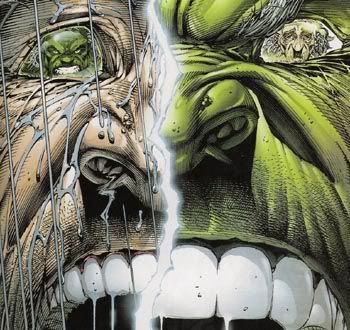
Overall, Giant-Size Hulk #1 is one of the most satisfying Hulk reads I’ve bought in a while. I feel more thoroughly Hulk-satiated with GSH than with any of the recently-released Hulk trades. At $4.99, it’s a steal. It’s honest-to-Zeus weird to feel so optimistic about the future of Hulk that I’m actually worrying about whether or not the creative team can keep up the pace and the quality. Civil War might not be keeping die-hard

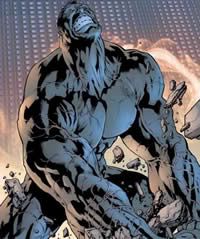 If you were to construct a list of the most volatile subjects among Hulk fans, the Ultimate line’s re-interpretation of the Hulk would be right up there with Bruce Jones’s run and Joe Casey’s snake. Hulk was first Ultimatized in Ultimate Marvel Team-Up #2-#3. The Ultimate Hulk wouldn’t show up again until Mark Millar and Bryan Hitch’s Ultimates, with Bruce Banner as second-in-command of the US government’s program to produce a super-hero team. Specifically, Banner’s job was to reproduce the super-soldier formula that created Captain America. Eventually, Captain America was found alive and frozen in a block of ice. With Banner’s job presumably made redundant because of this discovery, Betty Ross separated from him and dating movie stars, Hank Pym in Banner’s former leadership position, and people like Wasp and Tony Stark doing everything they can to antagonize him, Banner finds himself at the end of his rope. He had been cured of the Hulk after his initial transformation in Ultimate Marvel Team-Up, but purposely injects himself with a mixture of the old Hulk serum and Captain America’s blood in Ultimates to become the Hulk once more. As it was in the MU proper with the Avengers, the Ultimates’s first action is taken to control the Hulk, and Thor joins the team as a result. The Hulk who rampages through the Ultimate world’s Manhattan ain’t the misunderstood, good-hearted beast many Hulk fans have grown up with. The crimes committed by the Ultimate Hulk include mass murder, cannibalism, and (arguably, considering a scene from the previews of Ultimate Wolverine vs. Hulk) rape.
If you were to construct a list of the most volatile subjects among Hulk fans, the Ultimate line’s re-interpretation of the Hulk would be right up there with Bruce Jones’s run and Joe Casey’s snake. Hulk was first Ultimatized in Ultimate Marvel Team-Up #2-#3. The Ultimate Hulk wouldn’t show up again until Mark Millar and Bryan Hitch’s Ultimates, with Bruce Banner as second-in-command of the US government’s program to produce a super-hero team. Specifically, Banner’s job was to reproduce the super-soldier formula that created Captain America. Eventually, Captain America was found alive and frozen in a block of ice. With Banner’s job presumably made redundant because of this discovery, Betty Ross separated from him and dating movie stars, Hank Pym in Banner’s former leadership position, and people like Wasp and Tony Stark doing everything they can to antagonize him, Banner finds himself at the end of his rope. He had been cured of the Hulk after his initial transformation in Ultimate Marvel Team-Up, but purposely injects himself with a mixture of the old Hulk serum and Captain America’s blood in Ultimates to become the Hulk once more. As it was in the MU proper with the Avengers, the Ultimates’s first action is taken to control the Hulk, and Thor joins the team as a result. The Hulk who rampages through the Ultimate world’s Manhattan ain’t the misunderstood, good-hearted beast many Hulk fans have grown up with. The crimes committed by the Ultimate Hulk include mass murder, cannibalism, and (arguably, considering a scene from the previews of Ultimate Wolverine vs. Hulk) rape. 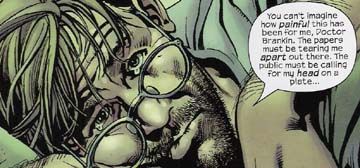
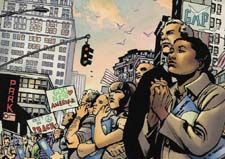 I have two problems with these arguments. First, while the Ultimate line’s less strict view of morality doesn’t limit the kind of Hulk stories that can be told, it does limit the kind of stories that can be told with the Hulk as a hero. Maybe I’m wrong, but I don’t think you can sell a mass-murder/rapist/cannibal as a sympathetic comic book protagonist. As soon as the smoke cleared in Manhattan after the Hulk’s rampage, and the artwork went as far as it could to make it look like NYC during the aftermath of 9/11, any hope of the Ultimate Hulk ever being portrayed as anything close to a super-hero was destroyed.
I have two problems with these arguments. First, while the Ultimate line’s less strict view of morality doesn’t limit the kind of Hulk stories that can be told, it does limit the kind of stories that can be told with the Hulk as a hero. Maybe I’m wrong, but I don’t think you can sell a mass-murder/rapist/cannibal as a sympathetic comic book protagonist. As soon as the smoke cleared in Manhattan after the Hulk’s rampage, and the artwork went as far as it could to make it look like NYC during the aftermath of 9/11, any hope of the Ultimate Hulk ever being portrayed as anything close to a super-hero was destroyed. 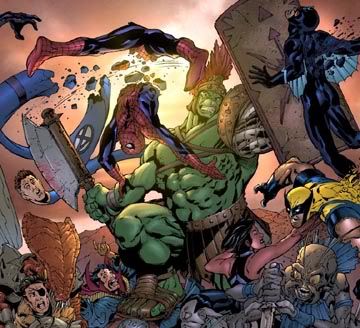
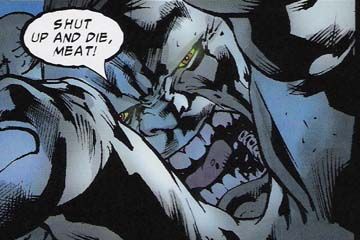
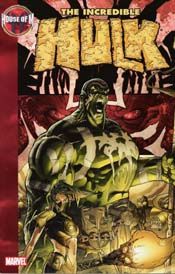 House of M: The Incredible Hulk
House of M: The Incredible Hulk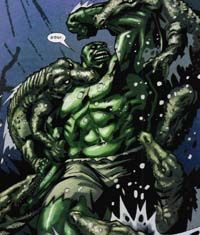 The thing that I liked most about the story was the introduction of Banner into the True People Tribe, particularly because the premise of Scarlet Witch giving everyone in the MU their hearts’ desires raises some intriguing questions. The most obvious question is why Banner doesn’t find himself cured of his more violent alter-ego, and why Betty Banner is nowhere to be found. I don’t think this is a fault of the story, far from it. There are answers, but David doesn’t bring them to the foreground. The answer to the first question, I’d imagine, is that Scarlet Witch’s magic doesn’t just give Banner his heart’s desire, but the Hulk gets his dearest wish as well (and it’s unlikely that wish is to be eliminated). The absence of Betty is trickier, though a potential answer is that Banner wouldn’t be happy with Betty around if he’s still Hulk because it would mean she would always be in danger. Regardless, I feel like a lot of great stories could have been made simply out of Hulk's introduction into, and involvement with, the True People Tribe. We saw something like this in David’s first run, in Hulk #454, when a Savage Land tribe made the Hulk its champion. Though, this was when Banner was in the "Heroes Reborn" world, and that tribal Hulk only lasted one issue. With Banner back in the mix this time around, there are some interesting questions to be asked. Why is being a part of the tribe a manifestation of Banner’s dearest wish? Why would the True People allow him into the fold in the first place? Would Bruce find a love interest in the tribe? Post-HoM, if Banner were to find out that this was supposed to represent his deepest desire, would he feel guilty about the absence of Betty? Would he feel guilty about still being the Hulk? There’s a lot to explore with this concept, but David doesn’t go anywhere with it. It’s all but abandoned. Bruce gets some paint thrown on him and apparently learns how to use a boomerang. That’s about it. There’s a suggestion that Bruce has embraced a new kind of belief system, but besides a couple of lines of dialogue (“My satisfaction does not matter. It is what it is.”), we don’t see any of it.
The thing that I liked most about the story was the introduction of Banner into the True People Tribe, particularly because the premise of Scarlet Witch giving everyone in the MU their hearts’ desires raises some intriguing questions. The most obvious question is why Banner doesn’t find himself cured of his more violent alter-ego, and why Betty Banner is nowhere to be found. I don’t think this is a fault of the story, far from it. There are answers, but David doesn’t bring them to the foreground. The answer to the first question, I’d imagine, is that Scarlet Witch’s magic doesn’t just give Banner his heart’s desire, but the Hulk gets his dearest wish as well (and it’s unlikely that wish is to be eliminated). The absence of Betty is trickier, though a potential answer is that Banner wouldn’t be happy with Betty around if he’s still Hulk because it would mean she would always be in danger. Regardless, I feel like a lot of great stories could have been made simply out of Hulk's introduction into, and involvement with, the True People Tribe. We saw something like this in David’s first run, in Hulk #454, when a Savage Land tribe made the Hulk its champion. Though, this was when Banner was in the "Heroes Reborn" world, and that tribal Hulk only lasted one issue. With Banner back in the mix this time around, there are some interesting questions to be asked. Why is being a part of the tribe a manifestation of Banner’s dearest wish? Why would the True People allow him into the fold in the first place? Would Bruce find a love interest in the tribe? Post-HoM, if Banner were to find out that this was supposed to represent his deepest desire, would he feel guilty about the absence of Betty? Would he feel guilty about still being the Hulk? There’s a lot to explore with this concept, but David doesn’t go anywhere with it. It’s all but abandoned. Bruce gets some paint thrown on him and apparently learns how to use a boomerang. That’s about it. There’s a suggestion that Bruce has embraced a new kind of belief system, but besides a couple of lines of dialogue (“My satisfaction does not matter. It is what it is.”), we don’t see any of it.
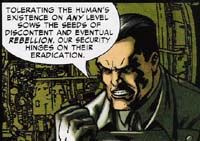 The House of Magnus element doesn’t make up for the loss of this richer concept. It lacks the subtlety in which Bendis framed the mutant-human oppression in House of M, and gives us a more black-and-white picture of the conflict. Exodus, the Governor of Australia, is a one-dimensional super-powered Hitler, and in the end he doesn’t even prove to be a worthy opponent. They really scraped the bottom of the bad-mutie-barrel for this corner of HoM. We get Unus the Untouchable, Pyro, and, God help us, Vanisher. The Hulk has a tougher time with a pack of crocodiles than he does with Unus, and the battle between Hulk and the muties in Sydney is so short, most of it is off-panel. We don’t even know, by the end of it, if Pyro and Vanisher were even involved in the thing. There are some predictable battles between Hulk and a bunch of A.I.M. cyborgs, and a lot of disingenuous non-insight from Hulk’s villain/love interest, Monica Rappaccini.
The House of Magnus element doesn’t make up for the loss of this richer concept. It lacks the subtlety in which Bendis framed the mutant-human oppression in House of M, and gives us a more black-and-white picture of the conflict. Exodus, the Governor of Australia, is a one-dimensional super-powered Hitler, and in the end he doesn’t even prove to be a worthy opponent. They really scraped the bottom of the bad-mutie-barrel for this corner of HoM. We get Unus the Untouchable, Pyro, and, God help us, Vanisher. The Hulk has a tougher time with a pack of crocodiles than he does with Unus, and the battle between Hulk and the muties in Sydney is so short, most of it is off-panel. We don’t even know, by the end of it, if Pyro and Vanisher were even involved in the thing. There are some predictable battles between Hulk and a bunch of A.I.M. cyborgs, and a lot of disingenuous non-insight from Hulk’s villain/love interest, Monica Rappaccini.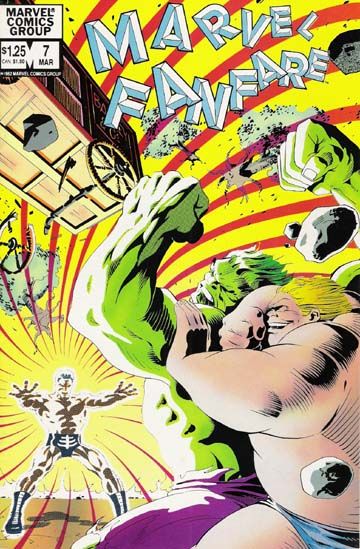
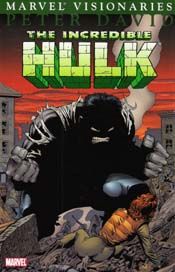 Hulk Visionaries: Peter David, Vol. 1
Hulk Visionaries: Peter David, Vol. 1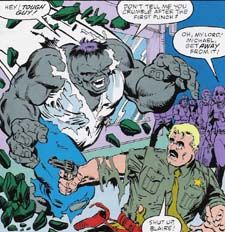 A cop. One cop. As in singular. As in less than 82 cops. As in not the Abomination or the Rhino or Thor or anyone else who could likewise lift large hills or small mountains.
A cop. One cop. As in singular. As in less than 82 cops. As in not the Abomination or the Rhino or Thor or anyone else who could likewise lift large hills or small mountains.
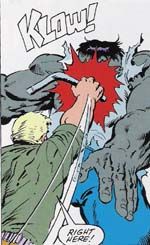
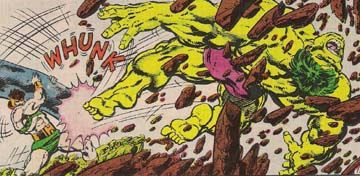
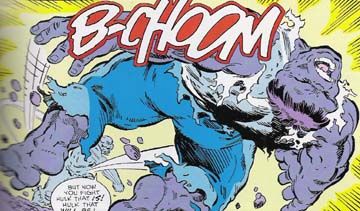
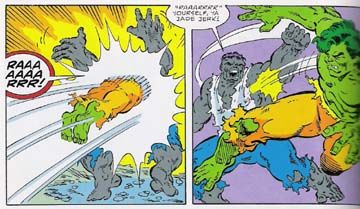
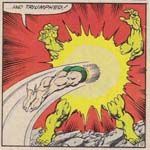

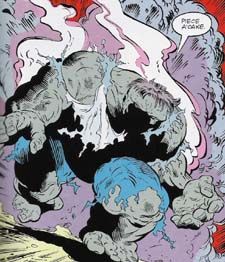 It isn’t until the last few chapters that we see McFarlane settle on the Hulk that defined his tenure on the book - the jutting forehead; elephantine skin; and the dark, unreal mass that often suggested fat more than muscle.
It isn’t until the last few chapters that we see McFarlane settle on the Hulk that defined his tenure on the book - the jutting forehead; elephantine skin; and the dark, unreal mass that often suggested fat more than muscle. 